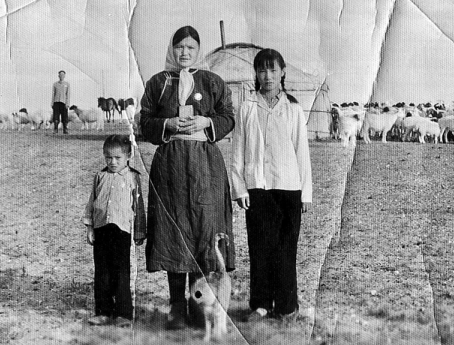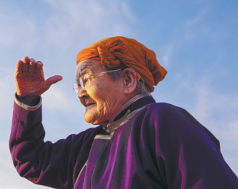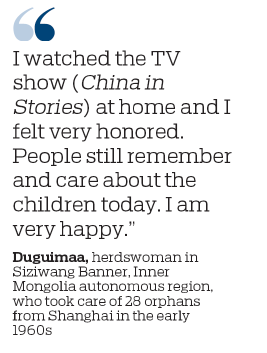Mother's love that keeps on growing

Story of herdswoman, who once gave 28 orphans a new home, continues to inspire, Chen Nan and Yuan Hui report.
Duguimaa, a herdswoman born and raised on the grasslands in Siziwang Banner of North China's Inner Mongolia autonomous region, became a mother at the age of 19 when she adopted 28 orphans from Shanghai in the early 1960s.
To foster the orphans, Duguimaa, then unmarried, taught herself to become an obstetrician and helped young mothers deliver babies when there was little medical equipment available at that time.
Now, at 79, Duguimaa has become a household name for her incredible story of raising the orphans and won a title of "grassland mother".
In 2019, marking the 70th anniversary of the founding of the People's Republic of China, the Central Committee of the Communist Party of China decided to grant the Medal of the Republic and national titles of honor for the first time to honor exemplary figures that have made outstanding contributions to the development of the country. Duguimaa, a member of the Communist Party of China since 1974, was awarded the title of "people's role model".
Besides the honor, Duguimaa's story with the children has been adapted into a movie, Song of Love, which premiered at the end of 2019, enabling more people to learn about the heroic woman and the history of the country in the 1960s.
On Nov 21, her story was adapted again by Chinese director Tian Qinxin in an episode of China in Stories, a CCTV variety show, which combines stage plays and talk shows to publicize well-known stories of the country's growth and people who made outstanding contributions to the country's development. Featuring actress Guan Xiaotong playing the role Duguimaa, the TV show has received positive feedback from the audiences and touched more people with Duguimaa's story.
"I watched the TV show at home and I felt very honored," says Duguimaa. "People still remember and care about the children today. I am very happy."
In the early 1960s, China was suffering from natural disasters and food shortages. Many children from the eastern provinces of Zhejiang and Jiangsu lost their homes and became orphans. The then-premier Zhou Enlai sought assistance from the Inner Mongolia autonomous region to get food for the orphans. Ulanhu, then the government director of the Inner Mongolia autonomous region, offered to take care of the children. By 1963, some 3,000 orphans were sent to Inner Mongolia autonomous region.
Duguimaa volunteered to work at the nursery, which changed her life forever. The 28 children, who were sent to Siziwang Banner, aged from less than 1 year old to 5 years old. Recalling her days of raising the orphans, Duguimaa says that she had no experience of raising children but she learned to become a mother bit by bit. Living in a Mongolian yurt, she stayed awake when the children cried at night. She took the children to the hospital by horse when they got sick.
"When they played outside, they were like little sheep, running around on the grasslands," she recalls. "Though life was tough then, it was a pleasurable struggle. When they smiled and called me mother, I was very happy. I just wanted to take care of the children.
"The children grew up on the grasslands just like us and though they were born far from Inner Mongolia, they got used to their lives here and love the local music and culture," she adds.
The majority of the orphans were later adopted by local Mongolian families and still live there.
Duguimaa, who lost her parents at the age of 11 and grew up with her aunt, cannot speak Mandarin but she can understand it. She speaks Mongolian and keeps in touch with the children, who are now in their 50s and 60s, through WeChat. During special occasions, such as Spring Festival, she receives greetings from those children.
"She not just gave us food and shelter, but also the love of a real family," says Jalgamj, 64, who came to Siziwang Banner at the age of 3 and was adopted by a local couple and has lived there since then. Jalgamj is married and has three daughters now. "She was there when we had no one. She gave me my second life."
Tsagaanchuluu, in her 50s, is Duguimaa's only biological daughter. She lives with Duguimaa and takes care of her.
"She has been mother and father, which made her a hard and strong woman. She loves the children and always offers help for people who are in need," says Tsagaanchuluu.
According to Erkhem, vice-director of publicity department of the banner, when COVID-19 hit Siziwang early last year, Duguimaa donated 5,000 yuan ($774) to the local Red Cross to provide protective gears for frontline workers.
"She did something extraordinary and her story deserves to be learned by more people," says Erkhem.
Contact the writers at chennan@chinadaily.com.cn


























